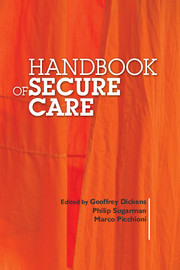Book contents
- Frontmatter
- Contents
- List of tables, boxes and figures
- List of contributors
- Preface
- 1 The evolution of secure and forensic mental healthcare
- 2 Mental disorder and offending
- 3 Clinical risk assessment in secure care
- 4 Risk management in secure care
- 5 Recovery in secure environments
- 6 Personality disorder
- 7 Women's mental health, aggression and offending
- 8 Offenders with intellectual disability in secure services and the criminal justice system
- 9 Secure mental healthcare for young people
- 10 Secure care for people with autism spectrum disorder
- 11 Acquired brain injury, trauma and aggression
- 12 Managing aggression and violence in older people
- 13 Firesetting in secure settings: theory, treatment and management
- 14 Specialist psychological treatment programmes in secure mental healthcare
- 15 Nursing in secure mental healthcare settings
- 16 Prescribing for specialist populations
- 17 Human rights in secure psychiatric care
- 18 Quality assurance and clinical audit in secure psychiatric care
- 19 Psychological support following violent assault and trauma: what works for staff in secure settings?
- Index
16 - Prescribing for specialist populations
Published online by Cambridge University Press: 02 January 2018
- Frontmatter
- Contents
- List of tables, boxes and figures
- List of contributors
- Preface
- 1 The evolution of secure and forensic mental healthcare
- 2 Mental disorder and offending
- 3 Clinical risk assessment in secure care
- 4 Risk management in secure care
- 5 Recovery in secure environments
- 6 Personality disorder
- 7 Women's mental health, aggression and offending
- 8 Offenders with intellectual disability in secure services and the criminal justice system
- 9 Secure mental healthcare for young people
- 10 Secure care for people with autism spectrum disorder
- 11 Acquired brain injury, trauma and aggression
- 12 Managing aggression and violence in older people
- 13 Firesetting in secure settings: theory, treatment and management
- 14 Specialist psychological treatment programmes in secure mental healthcare
- 15 Nursing in secure mental healthcare settings
- 16 Prescribing for specialist populations
- 17 Human rights in secure psychiatric care
- 18 Quality assurance and clinical audit in secure psychiatric care
- 19 Psychological support following violent assault and trauma: what works for staff in secure settings?
- Index
Summary
Introduction
This chapter examines good prescribing practice for patient groups in secure psychiatric care settings. Guidance on and principles of good prescribing practice are first considered, followed by a discussion of off-label prescribing with particular reference to antipsychotics for behavioural and psychiatric symptoms of dementia, clozapine for borderline personality disorder, the pharmacological management of aggression in acquired brain injury, rapid tranquillisation, antipsychotics for challenging behaviour in people with intellectual disabilities and prescribing for children and young people. The pharmacological management of treatment-resistant schizophrenia is also described, including the use of clozapine and clozapine augmentation strategies. A final section discusses high-dose antipsychotic prescribing and antipsychotic polypharmacy for patients with treatment-resistant schizophrenia.
Good prescribing practice
General guidance on good prescribing
There are some general principles of good prescribing practice that are relevant to prescribing for specialist patient populations. These are outlined in three documents that UK psychiatrists should be familiar with. First, the General Medical Council (GMC) in Good Medical Practice (2013a) states that as a doctor you should ‘recognise and work within the limits of your competence’ (paragraph 14), ‘prescribe drugs … only when you have adequate knowledge of the patient's health and are satisfied that the drugs … serve the patient's needs’ (paragraph 16a) and ‘consult colleagues when appropriate’ (paragraph 16d). Second, in Good Practice in Prescribing and Managing Medicines and Devices, the GMC (2013b) says that to ensure their prescribing is appropriate and responsible, doctors must keep up to date and be aware of current guidance given by the British National Formulary (BNF), the National Institute for Health and Care Excellence (NICE) (in England), the Department of Health and medical Royal Colleges. Other important elements of good practice include giving patients appropriate information about side-effects, prescribing dosages appropriate for the patient and their condition, and arranging monitoring where this is necessary. Guidance is also provided about off-label prescribing, for example ensuring there is a sufficient evidence base and/or experience of using the medicine to demonstrate its safety and efficacy. Third, the Royal College of Psychiatrists, in Good Psychiatric Practice (2009) reiterates the GMC guidance but also adds to it. This document states that psychiatrists must be aware of clinical guidance from national bodies and be able to justify clinical decisions that lie outside of accepted guidance, as well as being mindful of the limits of their own competence.
- Type
- Chapter
- Information
- Handbook of Secure Care , pp. 252 - 268Publisher: Royal College of PsychiatristsPrint publication year: 2015



